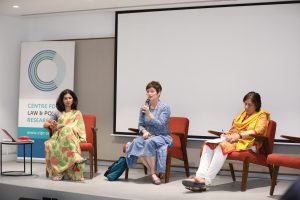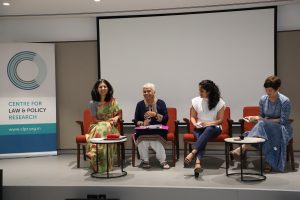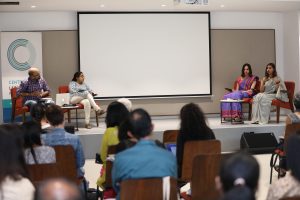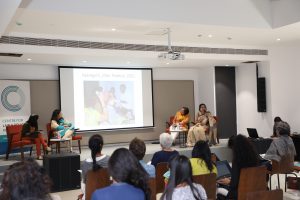On April 14th and 15th, we hosted the ‘Sexual and Reproductive Rights: Social Movements and Legal Battles’ conference, in collaboration with the University of Bergen, Norway and the University of Sussex at the Bangalore International Centre (see the full agenda here). The conference aimed to bring together prominent activists, academics and lawyers to discuss important issues and approaches that have developed in sexual and reproductive rights (SRR) advocacy in India. One of the key objectives of the conference was to shed light on issues and marginalised communities that are at the margins of SRR discourse and action.
This blog post presents the key points raised on day 1 of the conference. See this post to read about day 2 of the conference. Videos of the conference will be made available shortly.
DAY 1
Session I: Introduction: Framing Legal Approaches to Sexual and Reproductive Rights
Siri Gloppen (University of Bergen, Norway), Maya Unnithan (University of Sussex, UK), Jayna Kothari (CLPR)

Panellists introduced the conference by contextualising the conference within the broader history and framework of SRR, discussing advocacy strategies and identifying the limits of the discourse in the Indian context.
Siri Gloppen argued that SRR has seen advancement and push-back simultaneously. She drew attention to key legal strategies that are used to advance SRR around the world: (1) Litigation, (2) Legislative action through democratically elected political institutions, (3) Social mobilization. She argues that each of these strategies have been successful but have also become sources of contention and counter mobilization.
Maya Unnithan discussed the development of SRR discourse, framing it within international human rights conventions, transnational feminist mobilization, feminist ethics, and the relationship between SRR and the development of the right to health. She also contended that the concept of ‘human rights’ in general, and SRR in particular, receives push back in the Indian context for multiple reasons. The rights-framework is often considered to be a western concept that is too individualistic and thus, inapplicable to the non-western world. There is a conception that economic factors must be prioritised over SRR, as poverty constricts people’s choices to the extent that other rights can be considered a luxury. Further, religious factors and culturally specific gender ideologies also restrict reproductive and sexual freedoms. She argued that SRR advocacy ought to take into account the relationship between ‘rights’ and ‘justice’, where justice can be understood as a broader framework, and pay attention to new forms of inequality.
Jayna Kothari discussed why SRR was a pertinent topic that required attention in India at this moment. While a lot of the themes have been framed within SRR internationally since 2010, the recent judgements of the Supreme Court of India, confirming the right to privacy, the right to self-identify one’s gender, and the right to choice, make it possible to build SRR discourse and advocacy. She discussed the disadvantages of social movements working in silos, such as the women’s rights movement and disability rights movement, which can lead towards contradictory ends, arguing for the need to address tensions and dichotomies through this conference.
Session II: Sexual and Reproductive Rights and the Courts
Siri Gloppen, Jayna Kothari, Gauri Pillai (University of Oxford)

Siri Gloppen discussed the role of litigation in advancing SRR internationally from a comparative perspective. She raised the question: Can litigation produce social and policy change? In which circumstances can it and in which circumstances does it spur counter-movement? Historically, litigation efforts to advance SRR in India were criticised for being disconnected from social movements. However, this has changed in India and globally which has led to a stronger impact. She urged us to think more carefully about the strategies used to advance SRR.
Jayna Kothari discussed recent Supreme Court judgements which have dealt with the right to dignity, privacy, autonomy and bodily integrity and their relationship to SRR. These included cases such as: Puttuswamy v. Union of India, on the right to privacy, Joseph Shine v. Union of India, Suchita Srivastava v. Chandigarh Administration, Independent Thought v. Union of India, which have expanded the scope of Article 21 of the Constitution and the ambit of the right to autonomy and bodily integrity, the decriminalisation of adultery, which upheld the dignity of the individual in protecting sexual autonomy, and Navtaj Singh Johar v. Union of India which decriminalised homosexuality. She also argued against the Supreme Court’s overemphasis on medical boards when adjudicating cases of abortion. She further claimed that the Supreme Court has failed to articulate the right to bodily integrity and autonomy in cases where it was clearly in violation.
Gauri Pillai discussed SRR from the framework of equality and non-discrimination. She argued that SRR in India is often validated by recognising the right to life and personal liberty (Article 21), however the right to equality (Article 14) and non-discrimination (Article 15) are rarely invoked. For instance, in the case of Laxmi Mandal v. Deen Dayal Hospital (2010), a poor woman had died after repeatedly being denied maternal healthcare services. The court declared it as a violation of Article 21 but ignored the violation of Article 14 and Article 15(1) by not paying attention to the socioeconomic background of the woman which led to her ill-treatment. She argued that the invocation of Article 21 failed to capture that the absence of healthcare facilities for certain communities are result of inequality and discrimination.
Session III: Sexual and Reproductive Rights and LGBTI+ Persons
Trinetra Gummaraju (University of Manipal), Saumya Dadoo (CLPR), Vinay Chandran (Swabhava Trust)

Trinetra Gummaraju discussed transgender rights and experiences within the medical fraternity, sharing her personal experience and the history of diagnosing gender dysphoria. She argued that the relationship between the LGBTI+ community and the medical community has been fraught. Since the 1800s, heterosexuality has been seen as the norm and same sex desires and diverse gender identities have been considered abnormalities that require treatment. Trinetra also shared her own experience of transitioning.
Saumya Dadoo discussed the natal family as a site of domestic violence for LGBTI+ persons. She argued for inclusive feminist advocacy which recognises the violence of compulsory heterosexuality and reproductive coercion which is faced primarily by queer women but also by women who deviate from the norm of monogamous heterosexual relationships by never marrying or leaving relationships. She argued that the Protection of Women from Domestic Violence Act, 2005 can be used to protect queer women from natal family domestic violence.
Vinay Chandran discussed the treatment of LGBTI+ persons by the medical community when accessing healthcare services based on extensive interviews with the community in India. He argued that LGBTI+ persons are treated as physically abnormal and make attempts to correct same-sex desire and non-binary gender identities. These negative experiences of LGBTI+ persons discourage them from approaching healthcare professionals. However, this adversarial treatment is not seen as discriminatory.
Session IV: Sexual and Reproductive Rights and Health
Maya Unnithan, Jashodhara Dasgupta (National Foundation for India), Padma Deosthali (CEHAT)

Maya Unnithan discussed women’s right to bodily integrity. She defined bodily integrity as the freedom from restraint and interference from others in matters relating to one’s own body. She stated that women’s wombs are owned by others, like the state and the community which infringes on their bodily integrity. She also argued that the notion of embodied bodily integrity was important to bring together the social and mental components of bodily integrity.
Jashodhara Dasgupta discussed the historical development of rights, claims and notions of SRR in the context of maternal mortality based on her experiences founding SAHAYOG. She drew attention to stories and experiences of women who faced forced sterilisation and lack of access to contraceptives in Uttar Pradesh. She discussed that accountability of health services was identified as one of the primary needs to secure SRR. Finally, she argued for strategies beyond litigation and advocacy and for the importance of recognising collective identities and the specific marginalisation of Dalit and Adivasi persons.
Padma Deosthali discussed the integration of SRR in medical education. She presented the findings of extensive research which primarily placed emphasis of women’s role as mothers and perpetuated several misogynist myths regarding gender-based violence. She argued that SRR in medical education, such as in textbooks and training professionals, has to incorporate an intersectional gender-sensitive perspective.
Click here to read about day 2 of the conference.
